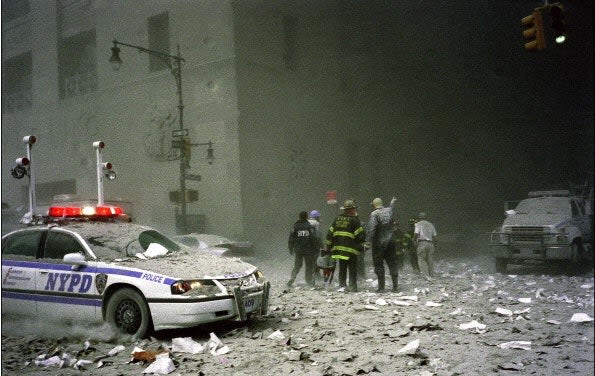Cognitive impairment, long considered a leading risk factor for Alzheimer’s and other forms of dementia, has been detected in a significant proportion of people who served as first responders during the 9/11 World Trade Center disaster, Stony Brook University researchers have found.
Researchers Say 9/11 First Responders Showing Signs of Cognitive Impairment
Cognitive impairment, long considered a leading risk factor for Alzheimer’s and other forms of dementia, has been detected in a significant proportion of people who served as first responders during the 9/11 World Trade Center disaster, Stony Brook University researchers have found.

For years, the lion’s share of public attention has been riveted on the cancers and respiratory conditions that have afflicted first responders, but mental-health disorders have been building all along, researchers reported Monday in the journal Alzheimer’s & Dementia: Diagnosis, Assessment and Disease Monitoring.
Cognitive impairment refers to poor memory and concentration — an inability to learn new information. Many people with cognitive impairment have difficulty performing the routine activities of daily living. Those who are severely affected ultimately develop full-blown dementia, experts say.
Virtually all of the first responders in Stony Brook’s research — 818 in all — reside on Long Island. Nearly 13 percent, or 104, of them had definite evidence of cognitive impairment and 1.2 percent, or 10 people, already had possible dementia, the study showed.
Moreover, responders undergoing mental health testing through the Stony Brook University World Trade Center Wellness Program were exceptionally young for having signs of cognitive impairment, which is most often diagnosed in old age, Sean A. Clouston, an assistant professor of public health and lead investigator of the new research, told Newsday.
More Patrol

Garmont Tactical’s LE Boot Lineup
In this video, we get a look at the latest law enforcement boots from Garmont Tactical, both for men and women. Kyle Ferdyn, sales manager, showcases four of the latest boots.
Read More →
Avon Protection Launches EXOSKIN-S2 High-Performance CBRN Protective Suit
With the commercial availability of Avon Protection’s EXOSKIN-S2, users now have increased options for their protective suit requirements across the spectrum of CBRN threat environments.
Read More →
Versaterm Acquires Aloft to Unlock a New Era of Drones for Public Safety
Versaterm has acquired Aloft, an FAA-approved Unmanned Service Supplier (USS) that specializes in real-time airspace intelligence and flight authorizations.
Read More →
Versaterm Launches Innovation Summit for Public Safety Drone Operations
The two-day DroneSense Innovation Summit by Versaterm will bring together public safety and industry experts to define best practices for scaling drone operations.
Read More →
What Makes a Good LE Boot?
Learn what makes a boot good for police officers as POLICE visits with Kyle Ferdyn, of Garmont Tactical, who explains the features of boots and why each is needed in an LE boot.
Read More →
Folds of Honor Opens Scholarship Application for Children and Spouses of Fallen or Disabled Service Members and First Responders
The application period for the Folds of Honor scholarship program is now open through the end of March. Scholarships support students from early education through postsecondary studies, easing the financial burden for families who have given so much in service to others.
Read More →
Team Wendy Now on GovX: Faster Verification and Discount Access for Eligible Professionals
With GovX verification now integrated directly into the Team Wendy checkout experience, eligible customers can confirm their status in just a few clicks and have the discount applied automatically.
Read More →
5.11 Debuts 2026 Footwear & Apparel at SHOT Show
5.11 showcased new apparel and footwear products during SHOT Show 2026, including new color options for the A/T Boa Lite Mid Boot and the Founder’s Jacket.
Read More →
5.11 Debuts New Load-Bearing Gear at SHOT Show
5.11 launched a variety of new load-bearing gear, ranging from backpacks to chest packs, designed for training, travel, and everyday readiness, this week during SHOT Show 2026.
Read More →
Streamlight Launches the Rechargeable TLR-3X & Other Lights at SHOT Show
Streamlight launched the TLR-3X and TLR-3X USB, two new weapon lights, and an assortment of other new lights during SHOT Show 2026.
Read More →
